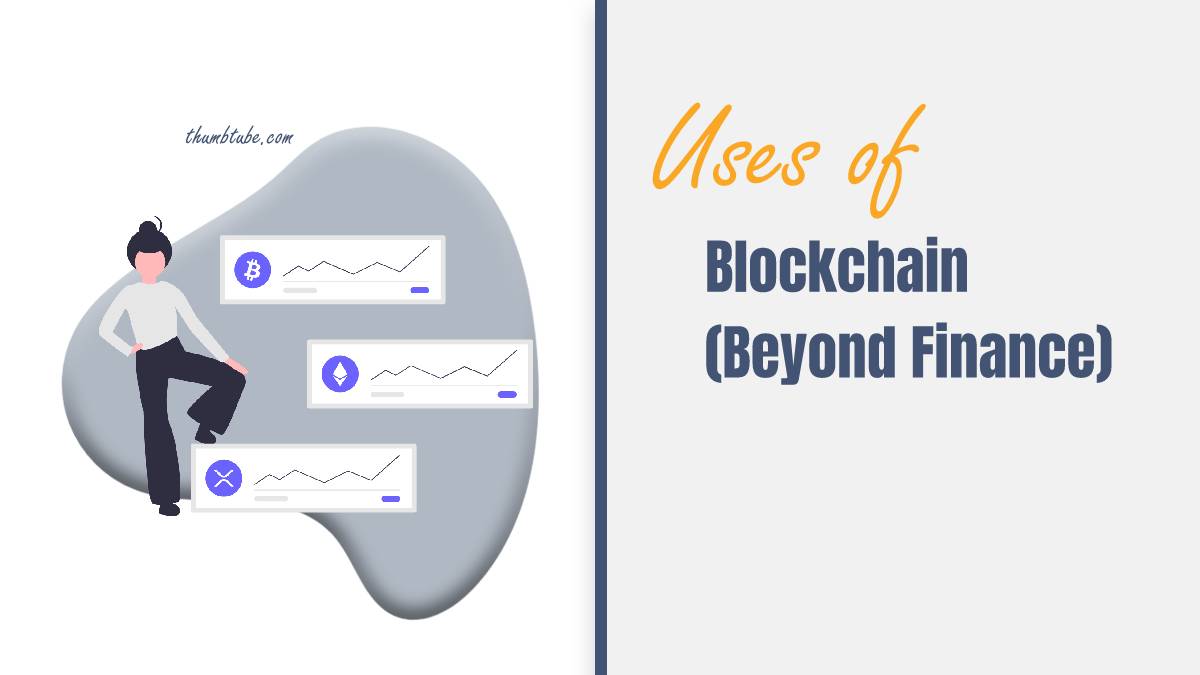Blockchain technology has been associated with cryptocurrencies and financial transactions. However, the potential of blockchain extends beyond finance. Blockchain is a distributed, secure, and immutable digital ledger that can be used for a wide range of applications, from healthcare to supply chain management to voting systems. In this article, we will explore some of the uses of blockchain beyond finance.

1. Healthcare
One of the primary applications of blockchain in healthcare is to improve the security and privacy of patient data. Blockchain technology can ensure the integrity and confidentiality of electronic health records (EHRs) by providing a tamper-proof, decentralized ledger that can be accessed only by authorized personnel. This can help prevent medical identity theft and fraud, which cost the healthcare industry billions of dollars annually.
Moreover, blockchain can facilitate interoperability among disparate healthcare systems, allowing patients and providers to share data seamlessly. This can improve the quality of care and reduce medical errors, as providers will have access to comprehensive patient information.
2. Supply Chain Management
Blockchain can be used to create a transparent and secure supply chain, which can reduce fraud, counterfeiting, and theft. Blockchain can provide a tamper-proof record of the entire supply chain, from the source of the raw materials to the end user.
This can enable manufacturers to track their products from the point of origin to the point of consumption, ensuring that they comply with ethical and environmental standards. Additionally, blockchain can provide consumers with a transparent view of the supply chain, allowing them to make informed decisions about the products they buy.
3. Voting Systems
Blockchain can be used to create secure and transparent voting systems, which can enhance the integrity of elections. Blockchain can provide a tamper-proof record of votes, which can prevent fraud and ensure that every vote is counted accurately.
Moreover, blockchain can enable voters to verify their votes and ensure that they are counted correctly. This can increase the trust and confidence of voters in the electoral process, which can help prevent disputes and promote democracy.
4. Real Estate
Blockchain can be used to create a secure and transparent system for buying and selling real estate. Blockchain can provide a tamper-proof record of ownership, which can reduce fraud and disputes.
Additionally, blockchain can enable buyers and sellers to complete transactions without the need for intermediaries, such as banks or real estate agents. This can reduce transaction costs and increase the efficiency of the real estate market.

5. Intellectual Property
Blockchain can be used to create a secure and transparent system for managing intellectual property (IP) rights. Blockchain can provide a tamper-proof record of ownership, which can reduce disputes and infringement.
Moreover, blockchain can enable creators to license their works directly to consumers, without the need for intermediaries, such as publishers or distributors. This can enable creators to retain more control over their IP and increase their revenue.
6. Charity
Blockchain can be used to create a transparent and secure system for charity donations. Blockchain can provide a tamper-proof record of donations, which can increase transparency and accountability.
Moreover, blockchain can enable donors to track the impact of their donations, ensuring that their contributions are making a difference. This can increase trust and confidence in charitable organizations, which can help attract more donors.
7. Gaming
Blockchain can be used to create a secure and transparent system for online gaming. Blockchain can provide a tamper-proof record of transactions, ensuring that players can trust the fairness of the game.
Additionally, blockchain can enable players to own their in-game assets, such as weapons or items, which can increase the value of these assets. This can enable players to monetize their gaming activities, creating a new revenue stream for gamers.
In conclusion, blockchain technology has the potential to revolutionize many industries beyond finance. From healthcare to real estate to charity, blockchain can provide a tamper-proof, secure, and transparent digital ledger that can improve the efficiency, transparency, and accountability of various processes. Blockchain has the potential to transform the way we store and share data, enabling new forms of collaboration and innovation.
As blockchain technology continues to evolve, we can expect to see more applications emerge in various industries. However, it is essential to remember that blockchain is not a silver bullet solution, and it comes with its limitations and challenges. It requires significant investment, expertise, and infrastructure to implement effectively.
Moreover, regulatory and legal challenges may arise when implementing blockchain technology in certain industries. However, with proper planning and collaboration, these challenges can be overcome, and blockchain can deliver significant benefits.
